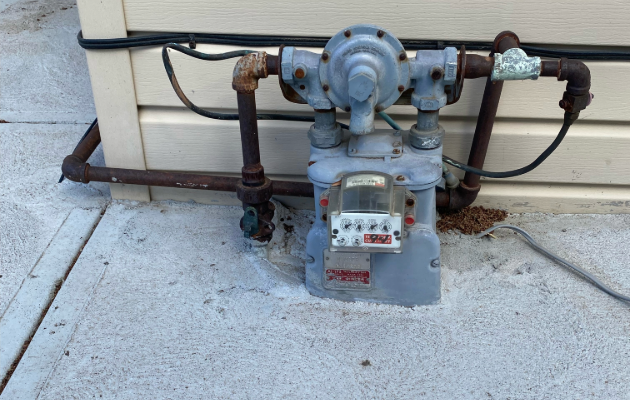
Call Before You Dig
Hit a pipeline? Call 911
If you think you’ve hit a natural gas pipeline, call 911.
Even minor damage to a pipeline can result in future leaks. Never bury a damaged line.
3 Easy Steps Before You Dig
Digging Safely
Your utility lines have been marked, and now it's time to get to work. Here are some tips how to dig safely near buried lines.
- Respect the marks and maintain them while digging.
- Make sure to always dig carefully around the marks, not on them.
- Dig with care near buried facilities, and follow hand-excavating rules.
- Some utility lines may be buried at a shallow depth.
- Don't forget that erosion or root structure growth may shift the locations of your utility lines, so remember to call again each time you are planning a digging job.
- Immediately contact NorthWestern Energy if you hit, touch, scrape, or damage a natural gas pipe. Even a small gouge, dent, crease, or scrape may cause future safety problems.
Why Contact 811?
At NorthWestern Energy, underground pipelines are a safe and reliable way for us to deliver essential electricity and natural gas to customers and communities.
- Underground lines are also used to transport water, sewage, irrigation, cable, internet and phone.
- Any of these lines could be running under your property.
- Some lines are only a few inches below ground.
- Hitting one of these buried lines while digging can knock out service, cost money to repair and cause serious injury.
- Contacting 811 ensures that you stay safe and that the underground utility lines are protected.
How to recognize a natural gas leak:
If you detect a natural gas leak, leave the area immediately. Don’t do anything that may cause a spark. Once you are in a safe area, at least 300 feet away, call 911.
- Smell: Natural gas is odorless, so we add an odorant called mercaptan. It smells like rotten eggs or sulfur.
- Listen: A natural gas leak may make a hissing sound or even a roar.
- Look: A leak can send dust or debris flying. It will also produce bubbles under water and can lead to discolored vegetation.
Call 811 before inspecting or clearing sewer lines
Learn more
For more information
Download our Natural Gas Pipeline Safety Brochure (~2MB)
Call (888) 467-2669 in Montana
Call (800) 245-6977 in South Dakota or Nebraska
According to the laws of the states in which NorthWestern operates, anyone who excavates, trenches, plows, drills, augers, blasts, strips topsoil or levels land is required to give notice at least two working days before any excavation work is started. Excavators who damage underground facilities without first calling to request and obtain locates must pay the full cost of repairs. In the case of personal injury or loss of life, as the excavator, you may be subject to a civil suit. When electrical, natural gas, and other service lines are ruptured or damaged, the responsible excavator is charged for the repair.
Responsibility of privately owned gas and propane lines
The maintenance of buried gas piping downstream of the gas meter to gas-fired appliances or other various structures on the property is the responsibility of the home/property owner or current occupant. NorthWestern Energy is required to inform customers with privately owned natural gas or propane service lines of their responsibility to inspect and maintain their piping (Code of Federal Regulations 49 CFR 192.16). Customers should have the pipes periodically inspected for leaks, and metallic pipes should also be inspected for corrosion by qualified professionals, such as a local plumber. Any unsafe conditions should be repaired immediately or the flow of gas should be shut off. Piping that is not maintained may be subject to corrosion or leaking. When digging near buried gas pipes, the pipes should be located in advance and the excavation done by hand. (Note that an 811 line location does not identify these lines and may require a private contractor to locate privately owned lines)
Responsabilidad de las líneas de gas y propano de propiedad privada
El mantenimiento de pipas de gas enteradas desde el medidor de gas a los aparatos que funcionan con gas u otras estructuras diferentes en la propiedad es la responsabilidad del dueño de la propiedad / casa o inquilino actual. Se le requiere a NorthWestern Energy informar a sus clientes con líneas de gas natural de propiedad privada o servicio de gas propano sobre su responsabilidad de tener inspecciones y mantener sus pipas de gas al (Código de las regulaciones federales 49 CFR 192.16). Los clientes deben tener inspecciones de las pipas de gas periódicamente para verificar que no haya fugas y se deben también inspeccionar por profesionales calificados las pipas de gas tan bien metálicos para asegurarse de que no tengan corrosión. Cualquier situación peligrosa debe ser reparada inmediatamente o se debe cerrar el flujo de gas. Si no se mantienen las pipas de gas puede estar sujeto a corrosión o fugas. Cuando deban realizarse excavaciones cerca de las pipas de gas enteradas, estas deben ser localizadas por adelantado y realizar la excavación a mano. (Tenga en cuenta que la ubicación de una línea 811 no identifica estas líneas y puede requerir que un contratista privado ubique las líneas de propiedad privada)
Do not build or pour concrete near meter



